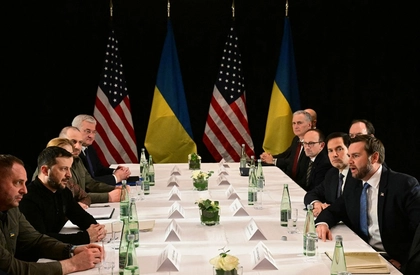The use of frozen Russian assets for Ukraine should be preceded by a long preparation of six to seven difficult stages and such a decision should be collective, and not at the level of one country, it should not be expected quickly, U.S. Special Representative for Ukraine's Economic Recovery Penny Pritzker has said.
"I view this as absolutely a good use of resources between all of us to try figure this out... It is a misperception to think this gonna be a panacea," she said in a discussion at the Ukrainian House, organized on the sidelines of the EEF by the Pinchuk Foundation, Horizon Capital and Western NIS Enterprise Fund, in Davos on Monday evening.
JOIN US ON TELEGRAM
Follow our coverage of the war on the @Kyivpost_official.
Pritzker acknowledged there was great hope that Russian sovereign assets could provide an easy source of financing and a solution as Ukraine needs billions of dollars and international aid begins to lag.
"I think one has to realize that the process, that the G7 came out with a statement that essence says Russia should pay and please ministers have to go back and figure out if there is some way that this we call Russian sovereigns assets could be utilized for that purpose," she described the current state.
Pritzker explained that there are six to seven difficult steps to achieve results in this process.
"You need legal theory, enabling legislation, what the governance process is, where you're going to spend it, ... who gets to vote, who is on the process," she listed a number of them.

Munich and After: An Unprincipled Mess
The U.S. Special Representative recalled that technically most of these funds are located in Europe and these assets generate income.
According to her, "a ton of lawyers' need to get involved [in this process], because whoever someone says legal theory you have to know that very and very smart people in the United States studied these legal theories, the United States' government is basically saying Russia needs to pay and there is a way to get it."
"Honestly, I think if a decision gets made, it's gonna be a collective decision... I don't think you'll see the US going to do anything, it's gonna be a collective decision... everyone has to agree," Pritzker said.
France's Special Envoy for Ukraine's Relief and Reconstruction Pierre Heilbronn also agreed that there is no miracle solution and that this is a joint effort and not the U.S. decision alone, and there should be a more or less common G7 position on this issue, taking into account technical and legal aspects.
"This will not fill the gap immediately which we have more or less to fill through our own means, financial means, military capabilities and everything else," he said.
Work related to Russian state assets also needs to pave the way so that the private sector can eventually be mobilized to support Ukraine, he said.
Heilbronn said $200 billion of the $300 billion is concentrated in one or two European countries, mainly in Belgium, and active work is underway in Brussels, one of the results of which was the European Commission's proposal on December 12 to use the proceeds from these assets.
"They are not ridiculously small, we are talking about EUR 15 billion over the next four years. And this is only what we call windfall profits made by Euroclear, the depository of Russian assets of the central bank," the French special representative said.
He said the issue of the use of these assets must be carefully considered, since, obviously, this could have a systemic impact on the euro.
You can also highlight the text and press Ctrl + Enter











